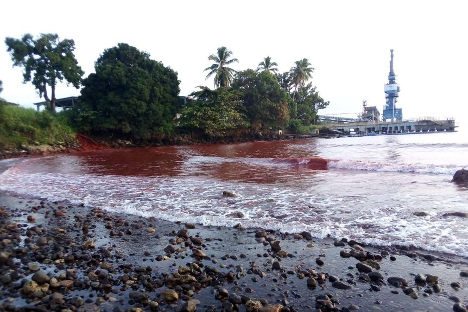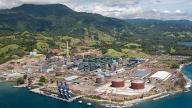As early as 2010, landowners living along the coast of the Bismarck Sea in Papua New Guinea (PNG) sought and won an injunction to stop mine tailings from the Ramu nickel-cobalt mine from entering Basamuk Bay via a pipe system coming from the processing plant. This type of mine waste disposal is known as Submarine Tailings Disposal and is effectively banned in Canada and many other countries.
The landowners' preventative legal action took them all the way to the Supreme Court of Papua New Guinea in their effort to stop the dumping of mine waste into their fishing grounds (Coumans 2019). At a lower court, Judge Cannings found that “there is a high likelihood that serious environmental harm over and above that predicted and authorised by the environment permit granted to the first defendant [Ramu NiCo] will be caused by operation of the DSTP [Deep Sea Tailings Placement].” He also found that the state’s approval of the waste disposal into Basamuk Bay was “contrary to National Goal No. 4 of the Constitution…which speaks to conserving the environment for the benefit of future generations.” Judge Cannings went to far as to say that “to discharge into a near pristine sea (a widely recognized hotspot of biodiversity), mine tailings (…) constitutes unwise use of our natural resources and environment, particularly in and on the seabed and in the sea.”
In a two-to-one decision in July 2011, the Supreme Court found that the mine could go ahead because of the possible economic ramifications for PNG of cancelling the permit that had already been granted, but ordered the mine to carry out regular environmental monitoring of the impacts of the tailings in the marine environment. If this has occurred the results do not appear to be made public.
In August 2019, the mine’s tailings transport system failed, spilling tailings that were on their way to the seabed near the shore, and turning the waters of the Bismarck Sea a bright red. A scientific report of the spill provided to the provincial government notes “alarmingly high level of contamination” in the ocean, natural water bodies, coastal communities, and agriculture.
MiningWatch Canada and US-based Earthworks have twice written to Toronto-based Conic Metals, which says its “asset base is underpinned by” its joint venture interest in the Ramu mine, in February and March. We have sought further information about the spill, about Conic Metals' response to the scientific report on the spill, and about the monitoring reports of the effects of the tailings disposal system that were mandated by the Supreme Court of PNG in 2011. Conic Metals touts itself as a company focused on metals for the energy transition required by climate change and one that “aims to conduct its business openly and with honesty and integrity, and strives to create an organizational culture that endorses ethical conduct and conforms to best practices.” We have had no response from the company to our letters.
For more information on this issue see our joint statement with Earthworks and the Papua New Guinea based Bismarck Ramu Group.
For more information contact: Catherine Coumans, [email protected]

